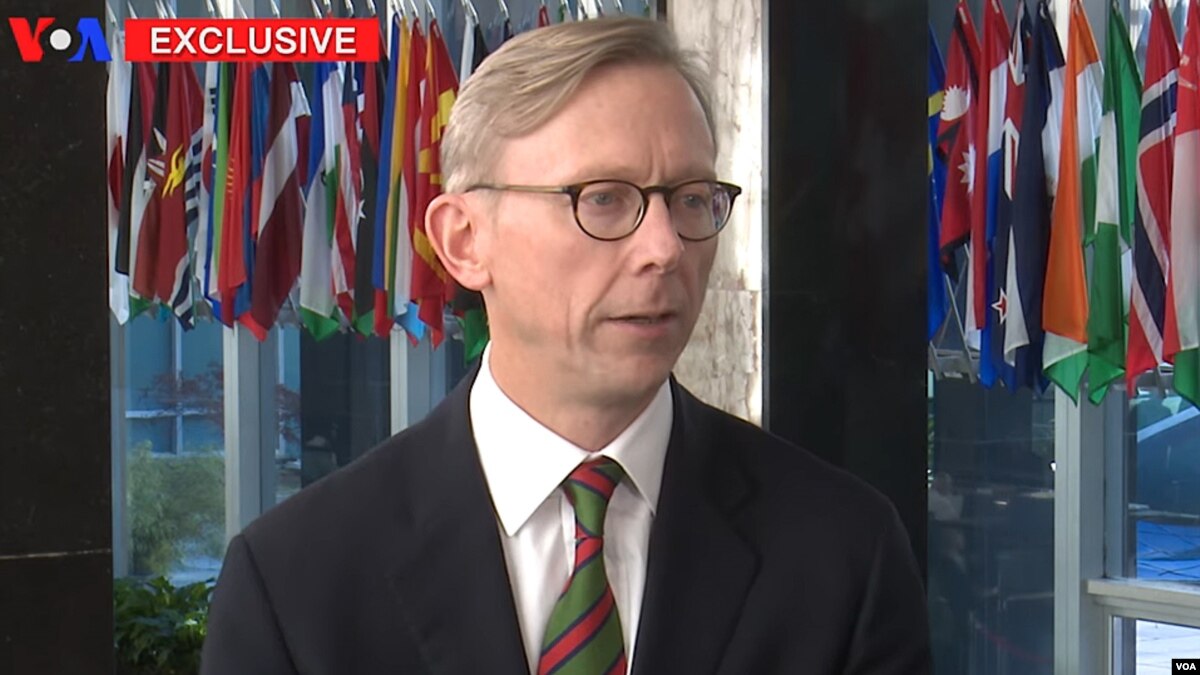
Washington is reconsidering its practice of letting hostile Iranian officials send their children to U.S. schools because it sees that as unfair to other Iranians, U.S. Special Representative for Iran Brian Hook says.
In an exclusive interview with VOA Persian at the State Department, Hook noted that most Iranians are barred from entering the U.S. because of their government’s perceived support of terrorism and other malign behaviors.
Hook had first raised the prospect of revoking U.S. visas of students related to Iranian leaders in a video posted to the U.S. State Department’s Farsi Twitter account on December 11. In the video, Hook said the Trump administration was working on the issue in response to questions from Iranian Twitter users, but he added that he could not discuss internal policy deliberations.
VOA Persian’s full interview with U.S. Special Representative for Iran Brian Hook:
Speaking to VOA Persian last Thursday in an interview broadcasted Monday on VOA Persian’s News at Nine program, Hook said: “One of the consequences of (Iran) being the No. 1 state sponsor of terrorism in the world is that it causes the U.S. and other countries to have to impose visa restrictions.”
He said Tehran also does not share “sufficient” information about Iranians who apply for U.S. visas, asserting that Iranian authorities “know what they need to do (and) the behaviors that they need to change.” Tehran says it is a victim of terrorism rather than a perpetrator.
Hook said the Iranian government’s behaviors have brought about a situation that is unfair to its citizens.
“The Iranian people understand that it is unfair for the regime to have its children here, and that same regime makes it very hard for its own people to get (U.S.) visas,” he said.
Hook also repeated his assertion, made in the December 11 Twitter video, that it is “hypocrisy” for the leaders of an Iranian government that encourages public chants of “Death to America” to also send their children to the U.S. for study purposes.
“These are some of the things that we are looking to change, in getting into a much better place for a better future with the Iranian people,” Hook told VOA Persian.
In June, the U.S. Supreme Court upheld Trump administration regulations banning the entry of most citizens of seven nations for security reasons. Those nations include Iran and four others with Muslim majorities, in addition to North Korea and Venezuela.
Under the travel ban, U.S. officials said they would continue to issue visas to Iranian students, subject to enhanced screening and vetting requirements.
U.S. TV network NBC reported earlier this month that families of Americans detained in Iran were urging U.S. authorities to deny visas to Iranian officials’ children in order to pressure those officials into releasing the Americans.
NBC said the families provided the Trump administration and several U.S. lawmakers with a list of U.S.-based Iranian nationals alleged to be the children or relatives of senior Iranian officials, including President Hassan Rouhani himself.
The NBC report said other people on the list include the son of Iranian Vice President for Family and Women’s Affairs Masumeh Ebetekar and the daughter of Iranian Parliament Speaker Ali Larijani. The report said the list came from relatives of some of the four Americans and one U.S. legal resident being detained in Iran on espionage charges that those relatives and U.S. authorities have rejected as bogus.
In comments published last month by pro-Larijani Iranian news site Khabar Online, Ebetekar said the decision of many Iranians to study in America in past decades “does not necessarily denote an approval of the hegemonic nature of the U.S. and its administrative policies."
Most readers who commented on the article were unimpressed by the comment and viewed her son’s study in the U.S. as contradicting her active role in the 1979 Islamic Revolution that ruptured Iran’s relations with Washington.
This article originated in VOA’s Persian Service.
No comments:
Post a Comment